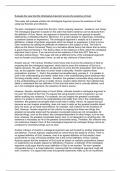Evaluate the view that the Ontological Argument proves the existence of God.
This essay will evaluate whether the Ontological Argument proves the existence of God
using key theorists and criticisms.
The term ‘ontological’ comes from the term ‘ontos’ meaning ‘essence’, ‘existence’ and ‘being’
The Ontological argument is based on the claim that God's existence can be deduced from
the definition of God. Hence, the argument is deductive (moves from general to specific
statements), contrasting inductive. Moreover, it is a priori (based on reasoning), contrasting
a posteriori (based on experience). The ontological argument is analytic as it is based on
definitions, instead of synthetic arguments which are based on experience. It tries to prove
God’s existence by adding the predicate of existence to the subject of God. This links to
ethics as the Divine Command Theory is a normative ethical theory that claims that an action
is good if God commands it. This theory relies on the existence of God, which the ontological
argument tries to prove. If we cannot prove the existence of God then DCT fails as a
normative ethical theory. This essay will look at different forms of the ontological argument
such as Anselm and Descartes’ forms, as well as key criticisms of these forms.
Anselm was an 11th Century Christian monk hence tries to prove the existence of God by
proposing the first ontological argument, which tried to prove the existence of God as a
logical necessity. He uses reductio ad absurdum to prove that the proposition ‘God exists’ is
true, as the opposite ‘God does not exist’ leads to absurdity. Anselm explains these
propositions: premise 1 - God is the greatest conceivable being, premise 2 - it is greater to
exist in the understanding and reality, rather than in the understanding alone (because then
the being actually exists), conclusion - therefore, the greatest conceivable being must exist
in the understanding as well as in reality. Hence, Anselm claims that the ‘fool’ (atheist) has
failed to understand the true definition of God and that when God is correctly defined, such
as in his ontological argument, the existence of God is proven.
However, Gaunilo, despite being a French Monk, criticises Anselm’s ontological argument in
his work ‘On behalf of the Fool’. He argues that using Anselm’s form of argument, we can
define anything into existence. For example, we can imagine the greatest conceivable
island, it is greater to exist in the understanding and reality than only in the understanding,
therefore, the greatest conceivable island must exist in reality. Hence, he argues that just
because we can imagine something, does not mean it exists as the greatest possible island
does not exist, as we need real evidence, for example, real evidence for the existence of
God. However, Anselm responds to this criticism by arguing how these two things (the
greatest conceivable island and the greatest conceivable being) are not comparable. All
physical things, such as the island, are contingent/dependent on other things, such as sea
level, whereas, the greatest conceivable being, God, is not dependent on anything else. His
existence is necessary as He is the greatest conceivable being. Therefore, this criticism may
not undermine Anselm’s form of the cosmological argument as contingent things cannot be
compared to necessary beings such as God.
Another criticism of Anselm’s ontological argument was put forward by another philosopher
and believer, Thomas Aquinas, arguing that we cannot know the essence of God. There is
no agreed definition of God, however, even if an agreed definition of God existed, there
would still be no way of knowing whether this is the correct definition of God. Instead,
Aquinas argues that the existence of God must be based on synthetic propositions (based
on experience) not analytic (based on definitions). However, a defender of the ontological
argument could argue that the exact definition of God is not needed. The term ‘greatest
conceivable being’ is a broad statement, meaning that the ontological argument could still
work. However, it is argued that broad and general statements make up for an insufficient




